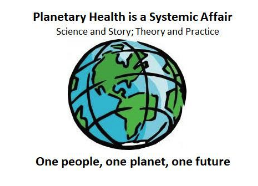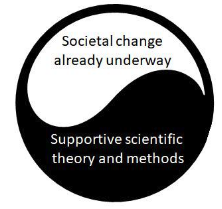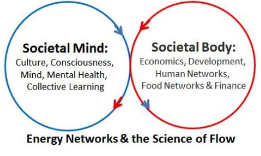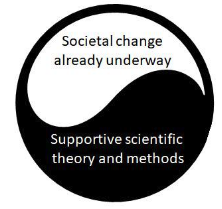Edinburgh, the home of the 1st Enlightenment, is calling for a 2nd Enlightenment – a paradigm shift in the way we care for humanity and the planet. It is using today’s 2nd Scientific Revolution to unify, clarify and add substance to the systemic solutions already emerging.

WHO WE ARE:
Initially introduced in a 2014 issue of The Economist, the concept of Planetary Health is based on the realization that human civilization and human health depend on flourishing natural systems, and that wise stewardship of natural systems is crucial given that they are being dangerously degraded to an extent unprecedented in human history.
Following the Rockefeller Foundation report, Safeguarding Human Health in the Anthropocene Epoch, the Foundation’s Lancet Commission created the Planetary Health Alliance, a consortium of over 120 universities, NGOs, government entities, research institutes, and other partners around the world, committed to advancing planetary health. We are proud to be a part of this unprecedented effort to address major public health threats caused by human impacts on the natural world.
OUR MISSION:
We have affirmed its commitment to make a significant, sustainable and socially responsible contribution to the UK and the world through the Sustainable Development Goals Accord. The mission is to promote better and more equitable health for all by creating, curating, and implementing all facets of global health knowledge for a healthier planet.
OUR FOCUS:
Given that planetary health is a systemic issue in which complex, interlocking elements of human systems are both the cause and the cure for poor planetary health, our primary focus is on integrating knowledge about how to reorient human systems themselves in a more socially, economically and environmentally empathetic manner in order to address the whole spectrum of mental health, from the positive aspect of enhanced emotional well-being to diseases associated with the brain, and its linkages with the health of natural systems. Complex system thinking leads us towards acknowledging that public health is affected by many sectors, both including and beyond the health sector, and the underlying systems in place that govern them. Thus we believe that the best way to improve planetary and human health is by improving the health of human systems themselves.

OUR STRATEGY:
Given that a revolution in “systems” thinking is underway both socially and scientifically, we seek to use the science of Regenerative Learning networks to unify, clarify and add empirical specifics to the 2018 Planetary Health meeting’s theme: “Reconceiving the kind of world we want to live in”.
There is increasing research that suggests that both emotional well-being, and, at the other end of the spectrum, brain disorders, are intertwined with a set of complex cognitive, emotional and social- environmental factors. At the same time, philosophers have suggested a relationship between the human mind and the physical environment across millennia implying a multifaceted relationship between the human mind and our environment. Applying complex systems thinking suggests that a multidisciplinary approach is warranted to better understand this relationship and the existing systems that underpin it, including the underlying incentives that drive the overall system. Taking such an approach will also allow us to understand better the blockages in the complex system that need to be addressed to allow better data collection, information flow, and the development of additional solutions to address mental health challenges and to enhance emotional well-being.
THE BIG QUESTIONS:
How can we achieve Planetary Health for all people and the planet, given the broad, interlocking nature of the problems we face. How can we bring the larger Sustainable Development Goal questions and responses to bear on the way Universities contribute to the world? We believe most of the issue-specific solutions we need exist but are currently disjointed. As yet there are no accessible pathways to an integrated understanding of science and story; theory and measures; policy and practice. We believe today’s new Systems stage of science can provide the framework we need to join these shards of solutions together in a functioning whole. We use the following Big Questions to focus this integration:
- What are the social, economic, ecological and scientific institutions that allow societies to create sustainable health care regimes?
- How do we create a health-care systems that remains? What are the current policies, practices and strategies that are embedded in the goals and national agendas to promote healthiness and wellness through a vibrant and sustainable, socially, economically and ecologically society?
- How can the science of flow networks and the patterns and principles of a self-organizing universe create a unifying framework and empirical measures that clarify the above?
- To what extent does consciousness form as a connective tissue which co-ordinates the dynamic evolution of perception and our interaction with the environment?
- What role does mental health and mindfulness play in systemic health?
- How is our physical and mental cognitive abilities interlinked?
- How are climate induced physical and mental illnesses posing a challenge for community-based healthcare systems and what are the political and economic benefits of a deterrent strategy?
OUR MULTI-DISCIPLINARY APPROACH
Because planetary health is a systemic affair, it requires an integrated multidisciplinary approach. Goal is to gather work from as many relevant disciplines as possible. We group this work into two categories.

Societal Factors:
Paradigms, Culture, Consciousness, Mind, Mental Health & Collective Learning
- Social and Behavioral psychology
- Philosophy of mind/Consciousness Studies
- Neuroscience
- Cognitive Science
- Ecological Psychology
- Climate Psychology
- Brain-based education
Policy-driven Factors:
Economics, Development, Finance and other networks
- Political-economics
- International Development
- Agriculture
- Urban planning
- Human Networks
- Food Networks
- Mental Health
- Healthcare innovation
The energy network sciences as a basis for rigorous theory and measures of human networks
Ph-LAB consist of a large group of partners, collaborators and advisors from a range of different disciplines and professions, ranging from psychology, cognitive science, neuroscience, medicine, economics, natural science, philosophy, ecology, and international development.
OUR GOAL:
A quiet gestation is underway. People all over the world and in every field imaginable have been using a “systems” lens to develop innovative solutions to thorny problems in fields from business and education to medicine and urban planning. Thanks to computers, a systems revolution is also sweeping through every field of science: anthropology to physics. These shifts go together. The science transforms our understanding of everything from human nature to the rules of economic vitality, while societal reforms ground this vision in a foundation of practical solutions.

Outcomes sought:
Short-term goals:
- Establishment of a diverse network focused on mental health and planetary health to facilitate multidisciplinary dialogue, sharing of information, analysis of underlying linkages and a clearer understanding of the underlying system and its related challenges.
- Documentation of existing and emerging solutions to address mental health challenges through a planetary health lens.
- Dissemination of Lab findings to a broad audience
Medium-term goals:
- Support/facilitate the uptake of solutions by key stakeholders, such as academia, medical/nursing profession, government, and urban planners.
- To write a research report and policy brief addressing the problem.
- To run seminars, workshops and conferences to attract global partners to connect and disseminate information.
Long-term goals:
- To develop innovative and high quality programs for health policy.
- To work closely with a select group of scientists and organizations to augment innovative policies to address problems.
- To provide a forum for the key exchange of ideas.
- To influence policy debates affecting planetary health by bringing together interdisciplinary researchers, health technological entrepreneurs and strategic representatives.
- To create fruitful research links between experts in global health in the academy and researchers looking at aspects of environmental health in other research faculties.